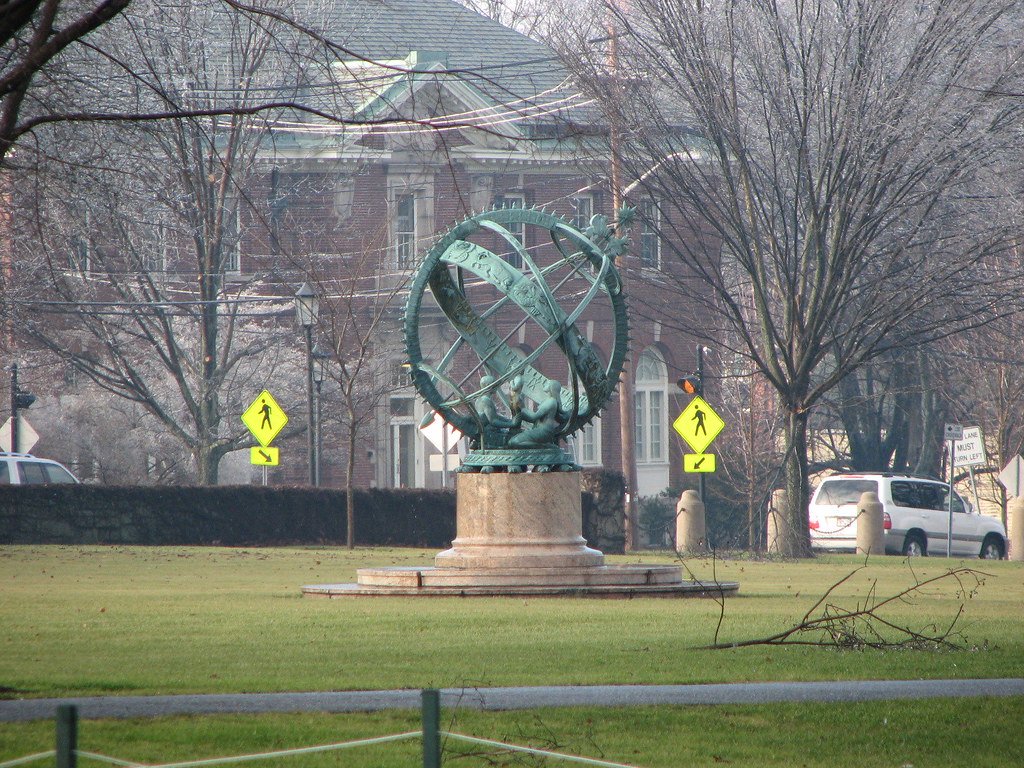Wednesday, December 31, 2008
Invasive species story of the week
I am the rare blogger who is related to an expert in invasive species, so I notice stories on the subject when they make it in to the popular press. Such as this one. How did a Florida alligator get to New South Wales?
CWCID: Jungle Trader.
(1) Comments
Stable Equilibrium
One of John Nash's simple but great insights into 'games with N players' is that any persistent situation you observe is an equilibrium (he was then able to derive the math describing price and quantity, for which he ultimately won a Nobel Prize). "Duh", you may say. Yet few people apply that insight to current events, essentially arguing that an equilibrium can change without, if you will, a supply or demand shift.
I heard Bill Clinton make this argument a few months ago in his standard post-presidential ($130,000) speech, citing it as the basis of political and foreign policy success. He says that people will act properly if you can "show them it is in their own interests". I'm not sure I buy that. As a boss, I can tell you that a room full of people who assert they can't figure out a simple filing system will be able to optimize their attendance to a new and complex overtime policy faster than a roomful of University of Chicago econometricians. Understanding isn't always the problem. More often you need to change the rules of the game to change behavior. Woody Brock reminded me of this yesterday.
As a first case in point examine discussion of Palestine. Those sympathetic to Israel say Israel must retaliate against barbaric suicide attacks, and buttress their argument with simple game theory and the notion of not "rewarding terrorism". At the same time, Palestinian apologists suggest that suicide bombing is the only recourse available to the Palestinians, citing the territorial incursions of Israel and its clearly superior military and economic might. Israel's sympathizers will point out, correctly, that the winning strategy for Palestinians would be passive resistance (I've made this argument). Palestinian apologists suggest, as my friend Ted does, that the Israelis should "at last understand that while they can win battles, they cannot win the war so the best thing would be to call it off."
Are both sides pursuing a sub-optimal strategy? Nash would say no, this has been going on for years, they must be pursuing optimal strategies given the game in front of them.
What are these rules that make seemingly self-destructive behavior optimal? I would argue they have everything to do with the powers around the Middle East, most of whom have a vested interest in sustaining the Israel-Palestine issue either as a distraction from their own failed regimes or their desire to ethnically cleanse the Middle East of Jews, Americans and proponents of secular governments. Hence Iran and Saudi Arabia's funding of terrorist cells in Palestine and the Iraqi awards to suicide bombers. In my view, the continuance of the Palestinian issue is entirely exogenous power politics. The cries from the Middle East that Palestine must be resolved before Iraq or other terrorist-sponsor states are truly "stasist" voices, attempting to preserve the status quo. They have put the cart before the horse, for no solution can hold without removing the pressure from other states who have an interest in perpetuating the conflict. That is why peace talks and accords have failed and might likely continue to fail. Talks and televised handshakes don't change the rules. It is the resolution or movement of other problems in the Middle East (no small order) that is most likely to cause the Palestinian issue to find a new equilibrium. Hopefully a peaceful one.
Clinton's notion that people can simply be taught to behave differently is actually pretty condescending. It starts from the assumption that people are stupid or simple, much as the common European view seems to assume that we can't expect more from Third Worlders. I'm also reminded here of the offensive term "Paleo-stinians" coming in to common usage in certain comment threads. Is there a chance we could stamp that one out?*
(4) Comments
Sex talk post of the day
Cassandra is writing about sex again. That minx. And Bird Dog posted a most excellent picture of her.
Truth be told, if you are married, plan to get married, or were married and are trying to figure out how it went wrong, you really ought to read her post. Regardless of your gender.
(15) Comments
Israel and the "proportionality" canard
Once again we are hearing that Israel's response to aggression is not "proportionate," as if this were a bad thing. Even smart and reasonable lefty bloggers are complaining about this, never mind the knee-jerkers. Ezra Klein:
There is nothing proportionate in this response. No way to fit it into a larger strategy that leads towards eventual peace. No way to fool ourselves into believing that it will reduce bloodshed and stop terrorist attacks. It is simple vengeance. There's a saying in the Jewish community: "Israel, right or wrong." But sometimes Israel is simply wrong.
There are two responses to this, one legal and the other geopolitical. First, the legal response from Ramesh Ponnuru:
The traditional just-war standard is that military action should be "proportionate" in that it causes fewer harms than it seeks to prevent. That's a sane and sound moral standard. It does not mean that military means must inflict only as much pain as the enemy has inflicted.
Now, you might argue that because Hamas has been recently ineffective at killing Israelis, the current assault is in fact inflicting more harm than it seeks to prevent. That logic is highly suspect; the point is not to prevent minor harms, but much bloodier future attacks that will no doubt occur if Hamas is not both interdicted and deterred, of which more below.
More on the legal arcana from Andy McCarthy here.
The geopolitical argument ought to be more persuasive than the legal to liberals, who no doubt wish we would join the community of nations and sign Protocol 1. Massive, militarily disproportionate retaliation is the cornerstone of deterrence, and without it there would be more war, not less. During 2006's Hezbollah war I wrote this post, which remains sadly germane to the present fighting with Hamas:
The left claims that the powerful states of the world, especially the United States and Israel, need not fear for their security because they can use their military power to deter aggression. To a post-Cold War lefty, the magic of deterrance supposedly obviates the need to intervene preemptively, or to remove regimes that commit "petty" acts of war against us or even declare themselves to be our enemy. See, e.g., the most frequently offered reasons why we should not have removed Saddam, or should not consider military options to deal with Iran. We can, after all, obliterate any power that actually attacks us, so why worry?
What your basic anti-defense lefty does not admit, however, is that effective deterrance requires not only the capability to retaliate, but that the threat to retaliate be credible. The former without the latter is worthless.
The requirement that retaliation be proportional reather than "massive" destroys the credibility of the threat to retaliate and therefore the effectiveness of the deterrance. Why? Because it allows the attacker to determine the price he will pay for launching the attack. If the attacker knows that he can absorb a blow equal to the one he delivers, then he will not be concerned that the defender has the capability to retaliate massively.
This is like limiting the penalty for property crimes to restitution. Why not rob the bank? If you're caught, you only have to give the money back.
The advocates of "proportionality", therefore, are undermining the effectiveness of threatened massive retaliation as a means for preventing war. If the left succeeds in promoting this ridiculous idea as a new norm of international behavior or requirement of international law, it will have destroyed the effectiveness of deterrance, the one means that we know reliably prevents war in the first place. Surely this is not what the left and the Europeans hope to accomplish.
No less an expert than Dwight Eisenhower institutionalized massive retaliation as the official policy of the United States. This was wise, for there was no other plausible way to deter the use of nuclear weapons. And it worked. "Proportionality" as it is now used by the chatterers criticizing Israel today is nothing more than a prescription for endless war.
Ezra, over to you.
MORE: Related thoughts here and here.
(13) Comments
Humanitarian question of the year
Is there any person with more regard for his fellow man than Glenn Reynolds? He is actually concerned with the welfare of bored people all around the world! And I agree. What with all the people worried about starvation, disease, war, and poverty, somebody has to speak out for the bored. Glenn has put his stake in the ground and said "the boredom stops here!," and I am down with that.
(5) Comments
Tuesday, December 30, 2008
The "worst climate predictions of 2008"
If I were an activist campaigning for aggressive reductions in greenhouse gases, I would be appalled at the crazy wrong climate predictions by my so-called fellow travelers.
(1) Comments
Vicki Iseman sues the New York Times
Remember back last spring when the Grey "Lady" ran a front page story that all but accused John McCain, on the basis of no evidence, of having an extra-marital affair with a Washington lobbyist? Well, the lobbyist in question, one Vicki Iseman, is suing the New York Times for all it is worth, more or less. OK, $27 million, but that's metaphorically "all it is worth."

Bloggers are having fun with the schadenfreude -- "GO TO TRIAL QUICK, WHILE THEY STILL HAVE SOME MONEY" -- but I wonder about the discovery. Truth is a defense to libel, so you can bet your bottom dollar that the NYT is going to do what it can to prove that Iseman and McCain did have an affair. Surely Iseman knows that, which means either that there was no affair or there was, but she figures that the Times cannot prove it. Since they can certainly depose her and ask her the question under oath, if she and McCain did have an affair she would have to perjure herself to sustain her case, which would be insane in a lawsuit of this profile. I'm with Jules (that either Iseman or the Times is insane), with one caveat:
Given that a lot of people are looking at being deposed under oath, and a discovery process is about to take place, it looks like someone, on one side or the other, is out of someone’s mind. Either that or Iseman just figures they will pay her a lot of money to drop the matter.
Agreed, so under what circumstances would the New York Times pay a lot of money it does not have in abundance to make Iseman go away? There are three scenarios.
First, its management learns during discovery that there was no affair and the story was wrong.
Second, the anonymous sources of the story are the only witnesses, and the Times cannot serve up those sources now to prove the truth of the story without breaking its promise of anonymity.
Third, there is some sort of hideous smoking gun email or other evidence that reveals that the editors of the Times were particularly out to take down McCain, and the NYT would rather pay a few million bucks than have that evidence surface.
My favorite theory is that there was no affair, and there is at least some evidence that Iseman's laweyers believe might cause the jury to see the story as an intentional smear. Any other answer would seem to require Iseman to perjure herself, always a bad idea.
(15) Comments
Technorati makes me sad
In the entire history of this blog, I do not think that we have gone 48 hours without having been indexed by Technorati. Suddenly, the great connector of the blogosphere has gone kaput. This blog has not been indexed in nine days notwithstanding numerous automatic and infinite pings. This is very stressful, since indexing in Technorati is the most common means by which bloggers signal that they have linked back. With Technorati down for this blog, at least, nobody knows what I'm writing about unless they come here directly.
Part of the problem is that Technorati has remained silent notwithstanding the squeals of countless bloggers. Judging from this thread on the Technorati discussion boards, there is a widespread and systematic problem with "Blogspot" blogs -- owned by Google -- in particular. One is forced to wonder whether the indexing strike (or failure) does not have something to do with the competitive battle between Technorati and Google's new "blogsearch" function. Regardless, Technorati needs to speak and reassure us all that it is not going under, because thousands of bloggers are, as my daughter would say, having a wiggins as I write this.
MORE: Finally, at around 8 am New Year's Eve, Technorati indexed this blog. Is it back, or was this merely a placating tease? We shall soon see.
(3) Comments
Soaked in beer, safe from cancer
If this is not the health news of the month, I don't know what would be:
IF YOU are frying a steak and mindful of your health, then marinate it in either beer or red wine. So say food scientists who measured amounts of a family of carcinogens found in fried steaks after steeping them in booze.
Cooking food increases levels of cancer-causing compounds called heterocyclic amines (HAs). Fried and grilled meat are particularly high in these compounds, because fiery temperatures convert the sugars and amino acids in muscle tissue into HAs. Various substances can reduce HA content: an olive oil, lemon juice and garlic marinade cut HAs in grilled chicken by 90 per cent, while red wine reduced HAs in fried chicken.
Is there anything beer cannot do?
(2) Comments
Why consumers are spending less
Henry Higgins rolls over
Asymmetrical outrage
If this picture were of a white man in Mississippi with the stars and bars on his rear bumper, it would be the subject of hanky-twisting and gum-flapping from coast-to-coast, or at least on the coasts. Change the guy holding the sign to a bearded dude who might be "of color," and suddenly illiterate anti-Semitism is just another man's free speech.
(12) Comments
If you live some place other than New Jersey...
...do not let this happen to your state. New Jersey is functionally bankrupt, and there is no sign that the state's political class is going to do a damned thing about it. The state has been waging war against employers for years, and the result is that 93% of the jobs created in the state from 2000 to 2007 were in the public sector. That is an extraordinary statistic for the United States, and it includes a period of long economic expansion elsewhere. I suspect that if the number were recalculated to include 2008 and then 2009 results, government jobs would account for more than 100% of total growth in employment.
Sadly, it is not only Trenton that is incompetent. Local governments in New Jersey spend money as if it were without limit, and, in many towns, there really is no limit. Most Princetonians now pay about 3% of the value of their home and property in annual property taxes. For this we get excellent public schools, but virtually nothing else. The fire and the EMS are volunteer, and trash collection is privatized so homeowners pay separately for that. Many of the roads in town are so potholed that they damage cars, and whenever the township does get around to repaving a street it takes forever and, no doubt, costs a fortune because somebody decided we needed Belgian block curbs all over town. Oh, and the sidewalks are now made of special and expensive "permeable" asphalt, because somebody read somewhere that impermeable cover was suddenly a big problem. (Our property, which is about two acres, is as permeable as it gets with about 1.5 acres of wetland and "flood fringe," and the Township engineer still forced us to buy the special permeable asphalt to rebuilt the sidewalk damaged by the construction of the house.) If it snows, all the begging in the world will not bring a snow plow past your home in time to make a difference. If you want to build something, you can delight in the deliberate speed of the building inspectors, notwithstanding their vested interest in your higher property taxes.
One would think that the voters would rebel, but they do not. Even in corrupt Chicago the voters will vote the rascals out if city services do not perform. In Princeton, the majority is content to keep voting in the same wasteful clowns as long as they dutifully pass resolutions denouncing some feature of United States foreign policy and shower sufficient honorifics on the right African-American Stalinists. It really is astonishing.
(21) Comments
Deleveraging, retail style
Glenn Reynolds links a short post by Megan McArdle on the precipitous decline in retails sales during November and December. Megan does not think it is all bad:
But it seems to me that this is actually good news for consumers and, in the long run, the economy. Americans are massively over their heads in debt, and have been consuming beyond their means for a long time. The data shows them cutting back their spending to more reasonable levels, and cutting back the most in the most discretionary categories. I feel bad for Hermes and all, but we couldn't keep propping them up forever.
This is all, obviously, just another example of the deleveraging that is going on throughout the economy. It is not just shoppers who are spending less -- which means they are saving more, at least for the time being -- but people in all their capacities, as homeowners, investors, small businesses, and corporations. As Megan says, Americans need to get their heads above the debt. It would have been better if they had come to this conclusion gradually over the last 20 years instead of all of a sudden over Labor Day weekend, but there you have it.
The little dig at Hermes conceals another point, I think. I am not economist enough to prove it, but I suspect that in the current climate most retail sales do not multiply through the economy as quickly as other expenditures, such as for personal services or construction. A huge percentage of our consumer products are imported, so a good part of the money spent on a television at Best Buy has to make a long journey before it will turn over again in the American economy (not exactly, because Best Buy bought the inventory before it sold it, but the point holds because Best Buy has to replace that TV with another one). If, however, I treat myself to a massage, or buy a dinner at Applebee's, or even hire a guy to put an addition on my house, that money, sometimes virtually all of it, will turn into spendable coin in days, hours, or immediately. Point is, I believe -- could some economist out there comment? -- that sales of imported products slow down the velocity of money relative to the average, and that sales of personal services increase it.
(6) Comments
Monday, December 29, 2008
Palin clan nomenclature
I, for one, am delighted that Bristol Palin and Levi Johnston have given birth to a healthy baby, and hope very much that they are successful parents. I admit that I have not encountered the name "Tripp" in this context -- in my world, Trip (usually with one "p") is a tiresome nickname for the third generation of the same name -- but I suppose if the baby's uncles are named Trig and Track, Tripp actually is, in some sense, the third. Indeed, given the precedent, we should all eagerly await the next male descendant of Sarah and Todd Palin. With Trig, Track, Tripp, and Todd already taken, what's left? Twig, Twang, Truck, Tractor, Target, and, I suppose, Tom, all leap to mind. Any other suggestions?
(15) Comments
Attention comic book fans
If you, like me, have thousands of comic books filed in little bags in your attic, you will probably want to watch the trailer for the next X-Men movie, Wolverine:
(5) Comments
Lest you were wondering...
Today is my birthday, and I had a lot of obligations which kept me away from you. Then, after a wonderful dinner at the Witherspoon Grill, the TigerHawk Teenager and I played networked Red Alert 3 for a couple of hours. Suffice it to say that he kicked my sorry tail. For those of you who do not know, Red Alert 3 is the latest in the long line of Command and Conquer games, which force you to allocate resources between the construction of military power and investment in the development of new resources. It is a lot of fun against a computer, but much more fun against your own son.
(7) Comments
Sunday, December 28, 2008
TigerHawk TV: In which I (endeavor to) explain why banks are not lending
The latest episode of TigerHawk TV is up -- I know your weekend is not complete without it -- and this time I address the vexing question, "with all this new government money, why aren't the banks lending?" It is a timely question; Niall Ferguson raises it in his excellent speculative "look back" at 2009, I discussed it in a post about six weeks ago, and you can be sure that if the situation does not change politicians and reporters will complain loudly whether or not they actually understand what is going on. Your comments -- on the substance, the format, or my personal grooming -- are, as usual, more than welcome.
Yes, that sweatshirt does say "The Factor Staff" on it, but I am not actually on the staff of "The O'Reilly Factor," which is a shame because then I would actually have met Megyn Kelly. I think I got it for knowing the fellow who writes the O'Quiz, which makes me a "Factor Web Site Staff groupie," which is much less impressive.
(8) Comments
The best looking car I have ever seen
Now, this is what I call a car!
Yes, that is a tiny little tiger hood ornament (click here for the big version). How cool is that?
(3) Comments
A note on last-minute charitable giving
I am not a very organized person, so when I finally got around to doing my 2007 taxes I was surprised to learn that I had given less to charity than, well, I was brought up to do. I'm a little more on top of things this year, and have given to most of my usual worthy and indulgent causes already, plus a couple of new ones. In a couple of cases I know that I want to give to a cause, but I do not know which charity is best. Rather than just giving to the charity with the best brand management, I use Charity Navigator, which rates charities according to a whole host of potentially relevant considerations. If you, too, are behind on your giving this year you should check it out and let us know what you think in the comments. And whatever your charity, dig deeply. The massive job losses among the affluent have put many very worthy charities in a world of hurt this year.
(0) Comments
The O'Bubble
The "bubble" is closing in on Barack Obama, and it is getting on his nerves. I sympathize with him, and hope that he succeeds in enlarging the president's zone of privacy. It would be good for him, his presidency, and the country. The only people it would be bad for are the media, who routinely confuse the "public's right to know" with their own desire to tell. But why should we care? Do we really get better service from our president because every moment of his life outside of his private quarters is subject to our scrutiny? Who cares if he dodges the press pool to go to a water park with his daughter? Assuming that time doing fun things with his family recharges Barack Obama as it does many other fathers, ought we not want that for our president?
As for giving up the Blackberry, do we really want our president to be deprived of the managerial power of email because it is more discoverable than a telephone conversation or a face-to-face meeting? If the Republicans were smart about playing the long game -- which they manifestly are not -- they would propose legislation carving out email to and from presidents from legal discovery, Congressional investigation, or preservation under records statutes. Such a rule need not immunize official communications merely because they are sent by email, but ought to exclude conversational email. I can imagine that the obvious benefit -- allowing the president to bypass his gatekeepers or the chain of command and have candid conversations with actual people -- would far outweigh the increased accountability, if that is what it is, that comes from treating all email as an official record.
CWCID: Glenn Reynolds.
(27) Comments
Accuracy in media
If by "accuracy in media" people meant stories like this, then I suppose there would be no controversy over it.
(3) Comments
Saturday, December 27, 2008
Looking back on 2009
My new favorite historian, Niall Ferguson, has written a speculative "look back" at 2009. In the political analysis there is something in there to annoy everybody (except, perhaps, wholly unreconstructed fans of Barack Obama), but the economic forecast is as spot-on as any I have read. Note particularly Ferguson's claim, which I have read elsewhere, that notwithstanding European whining that the present crisis is the fault of the United States, their banks have even more bad loans than ours. The U.S. dollar will continue to be a safe haven, in Ferguson's vision, and the "Chimerica" linkage will strengthen rather than weaken. All interesting, even if scary, stuff.
(12) Comments
India's Gitmo?
If you guys think that we mistreat the jihadis in our custody, wait 'till you see what India is doing to the surviving Mumbai terrorist.
(3) Comments
A book to read
As previously reported, I am in the middle of Amity Schlaes book The Forgotten Man: A New History of the Great Depression. It is an excellent and very entertaining read about an era that most Americans know about only as mythology. In a curious sign of the times, as of this writing The Forgotten Man is ranked #78
on Amazon, which is remarkable considering that the paperback edition was published more than six months ago. The success of the book is both good news -- it shows that Americans have not lost their capacity to learn about the past when it is useful to do so -- and bad. We would not all be reading about the Great Depression if we were not trying to figure out whether we are headed into another one.
(4) Comments
Is Mr. Shoes Iraq's "Joe the Plumber"?
If you read this story about the upcoming election in Iraq and know anything at all about the history of our own fractious country, you cannot help but think that Iraqis are getting the hang of this democracy thing. In particular, the upcoming trial of Muntadar al-Zaidi, the reporter who tossed his shoes at President Bush, is becoming just another campaign controversy. I suspect, without knowing, that there is even an Iraqi blogosphere arguing about it.
(2) Comments
Friday, December 26, 2008
Santa for the masses. Literally.
Am I the only one who finds it curious and thrilling that the two largest depictions of Santa Claus in the world today are in India (at right) and China (below), and that pictures of both are among the "most emailed" photos on the Yahoo News page? What ought we make of this? My answer: that Santa Claus is the most commercially significant and internationally appealing non-religious legend in the history of the world.
(2) Comments
Goose, gander question of the day
Here's a good question for any of the mainstream media folks who trip over this blog on their way to somewhere else:
I hate to go all Grinchy the day after Christmas, but can anyone tell me why is it okay for Barack Obama to spend Christmas during the worst economic downturn in decades in the course of which thousands of Americans face losing their homes in Hawaii in a 9 million dollar house body surfing and playing golf when it is not okay for the leader of the free world who has been presiding over two wars for several years to clear brush at the rather modest ranch he owns in Texas during hurricane season?
Well, duh. It's not what you do, it's how you do it. And, of course, what party you are.
(8) Comments
Pork, UAW style
If we're going to get all worked up over the compensation for executives in the industries that are getting extraordinary government assistance, how should we react to news of a union-owned resort that loses millions of dollars per year?
Even as the industry struggles with massive losses, the UAW brass continue to own and operate a $33 million lakeside retreat in Michigan, complete with a $6.4 million designer golf course. And it's costing them millions each year.
Now, my corporate toolhood prevents me from getting too sanctimonious about all of these suddenly scandalous indulgences that are taken to be an affront to the sensibilities of the (self)righteous, but I do think this: Just as I would have no sympathy for a money-losing business that maintained a corporate retreat for its executives, I have none for union officials who use the hard-earned dues of their members -- many of whom are or will be unemployed -- to maintain a farooking private golf course. A golf course?!? Even I think that golf is a waste of money (and, in any case, as a blogger and an underwriter of horses, I have neither the time nor the money to play it). These are lunch pail guys who have somehow, for some reason, developed bistro tastes.
Anyway, the romantic in me wants to know whether anybody other than Fox will report this story.
(5) Comments
Exploitation link of the day
If you do not like bodypainting, under no circumstances click through to this picture of Hugh Hefner's Christmas card, which includes both Hef and the twins that he is currently "dating."
(6) Comments
Buy when there is blood in the street!
I'd be doing you, and me, a great disservice if I failed to link to Amazon's massive post-Christmas sale. Buy when there's blood in the street!
Seperately, I need some computer advice. I'm going to buy a new desktop PC. My first inclination is to "build" one with the specs I want at Dell or HP, so if any of you have recent experience with either or both vendor I'd love to hear about it. Of course, if there are better vendors or more emphatic bargains available, I'd love to hear about those, too.
(12) Comments
Autoworkers vs. bankers: The less deserving than thou cage match
Megan McArdle sorts out the "fireside equities" in "bailing out" auto workers vs. bankers. Lefty rhetoric notwithstanding, she is more than a little persuasive that neither the car companies nor their unions would want the deal that the government gave to the bankers. The flip-side is also true:
[M]ost of the people who Hilzoy thinks of as picking on the auto workers would be willing to accept a deal in which the Big Three got some funds in order to put its balance sheet back together, then started firing people at will until they were small enough to make a profit again.
No question.
CWCID: Glenn Reynolds.
(0) Comments
Is something screwy with Technorati?
If you are a blogger, you use the blog search engine Technorati to communicate with other bloggers. In theory, whenever you post your servers "ping" Technorati to come and register your new outbound links. There is also a manual feature so that you can ping Technorati if it has not come automatically.
Well, much to my irritation Technorati has not pinged this blog automatically or in response to a manual poke in the last four days. If I were not otherwise of great equanimity, it would drive me bonkers. Anybody else having that problem?
(5) Comments
A Bush legacy you have never heard of
Betcha didn't know this:
Although the number of uninsured and the cost of coverage have ballooned under his watch, President Bush leaves office with a health care legacy in bricks and mortar: he has doubled federal financing for community health centers, enabling the creation or expansion of 1,297 clinics in medically underserved areas....
As governor of Texas, Mr. Bush came to admire the missionary zeal and cost-efficiency of the not-for-profit community health centers, which qualify for federal operating grants by being located in designated underserved areas and treating patients regardless of their ability to pay. He pledged support for the program while campaigning for president in 2000 on a platform of “compassionate conservatism.”
In Mr. Bush’s first year in office, he proposed to open or expand 1,200 clinics over five years (mission accomplished) and to double the number of patients served (the increase has ended up closer to 60 percent). With the health centers now serving more than 16 million patients at 7,354 sites, the expansion has been the largest since the program’s origins in President Lyndon B. Johnson’s war on poverty, federal officials said.
Considering the source, it is a remarkably positive story. The only thing unremarkable is the timing. Insofar as essentially the same story might have been written at any time in the last three years, why wasn't it?
(10) Comments
Thursday, December 25, 2008
About those talks without preconditions...
You know that idea about having talks with Iran without "preconditions"? Well, there is one condition we really ought to insist upon:
BBC Persian service has reported a speech by General Mohammad-Ali Ja'fari, chief of the Revolutionary Guards, who had a speech in the former U.S. embassy in Tehran spoke about how it might be necessary for paramilitary and revolutionary students to once again take foreign diplomats hostage. In such a situation, he said, the IRGC would support the hostage-takers.
Thanks for the warning.
(2) Comments
The Twelve Days of Global Warming
At the risk of "politicizing" science -- and with only 26 days left in the Bush administration, who better than me to carry on the tradition? -- we proudly present "The Twelve Days of Global Warming" from the dangerous subversive conspiracy, "Minnesotans for Global Warming":
Of course, the science in this video is extremely suspect and should on no account guide public policy. There are, actually, only five oceans.
MORE: "How Al Gore Saved Christmas". In Toronto.
CWCID: Anthony Watts.
(7) Comments
The view from our window
Here was the view from our living room this morning, shot during a break in the action:
(4) Comments
Iraq makes Christmas an official holiday
Iraq keeps surprising the gloomsters. Once, it was received wisdom among the anti-war intelligentsia -- and some erstwhile supporters of the war -- that Iraq ought to be busted into at least three parts. Nobody believes that today, especially not Iraqis. Another canard was that Americans were, in effect, dying to establish Islamic law, an "Islamic Frankenstein monster." Now, the democratic government, looking forward to having to face voters at the ballot box and govern the country without help from the Americans, has declared Christmas a national holiday. American defeatists have found reason to be churlish even about this, but none respond to the essence of the story: that it is now politically advantageous for the government of Iraq, which has demonstrated an acute sensitivity to public opinion (such as over the status of forces agreement), to recognize the holiday of Christmas, not to curry favor with Christians or the United States, but as an unmistakeable gesture of reconciliation. Reconciliation attracts votes. Is that not powerful evidence that the counterinsurgency has prevailed and the jihadi scheme to blow the country apart has failed? What's not to like about that? Other than, of course, the confusing possibility that George W. Bush might not have done everything wrong.
CWCID: Glenn Reynolds.
(9) Comments
The toys of our childhood
If you are a child or the parent of one, certain Christmases are, indeed, about the toys. If you are a boy of a certain age -- I'd say between the ages of 40 and 50 about now -- do not miss Bill Whittle's homage to the greatest toys of our youth. Yes, he does mention Creepy Crawlers, one of the tragic casualties of our national plague of tort lawyers.
CWCID: Glenn Reynolds.
(1) Comments
The meaning of Christmas
Wednesday, December 24, 2008
The tiger in winter
Merry Christmas. Settling in for the evening 'round these parts...
Because you read this blog, you almost certainly are the sort of person who remembers his or her blessings, and marvels that you were lucky enough to be born in the greatest country man on earth ever devised. Sadly, there are too many Americans who forget that they drew a great hand simply for having been born here. Be thankful you are not one of them.
Tip o' the Santa cap to a reader for the great tiger picture.
(5) Comments
Hair shirt alert: The greenies gun for the Christmas lights
The Grinch, it turns out, really is green:
SCIENTISTS have warned that Christmas lights are bad for the planet due to huge electricity waste and urged people to get energy efficient festive bulbs.
While nobody can plausibly argue against "energy efficient festive bulbs," do the "scientists" pushing this story genuinely believe that it will increase the political support for conservation?
(6) Comments
A holiday appeal from Wikipedia
Wikipedia, which is both non-profit and free of advertising, is looking for a corner of your charitable giving this year. Founder Jimmy Wales makes the case here. I think that Wikipedia is a wonderful resource, shortcomings notwithstanding, and kicked in a few bucks. Consider doing the same.
(3) Comments
In which I (slightly) defend the New York Times
So, the publisher of the New York Times has some sort of cozy and possibly hot relationship with Caroline Kennedy, and the Times is deleting comments on the subject that go up on its web site. I confess that even I find it hard to get worked up over this one. Indeed, if I controlled a major newspaper and Caroline Kennedy were my main squeeze, I would no doubt order my minions to do the same. Among other reasons, my main squeeze would think I were an incredible wuss if did not give that order, which is reason enough for me, most other men, and, no doubt, "Pinch" Sulzberger.
Now, with all of that said, Gawker's post puts a recent Times editorial on Caroline Kennedy in a slightly different light. This paragraph, in particular, is a least slightly disingenuous:
As someone who has guarded her privacy, is she ready for the heat and the criticisms that are about to bear down on her? How would Ms. Kennedy fare in dealing more publicly with the crowds and the media scrum?
Apparently Kennedy has had a little help in "guarding her privacy." It does seem to me that if the editorial board wants to go out of its way to make a point about Kennedy's relationship with the "media scrum" it ought to mention her "ties" to the publisher of the Times, or something like that, just so we get the point. Better yet, avoid the subject altogether, which would be fine with me. Either way, the editors -- not Pinch -- were a bit too cute for their own good.
CWCID: Glenn Reynolds.
(5) Comments
Tuesday, December 23, 2008
When journalists help the government go after a president
Would it trouble you to learn that one of the most famous reporters in the history of journalism allowed himself to act as the instrument of a plot by the FBI to destroy a presidency?
This is the problem with relying on anonymous sources: the story cannot be understood without knowing the source's motives. My modest proposal for reforming the ethical rules of journalism pointedly addressed this very issue.
(9) Comments
RatherGate returns on NPR
Today we went skiing on Whiteface -- the mountain near Lake Placid -- and on the way I subjected my poor family to North Country Public Radio, or, rather, to me listening to North Country Public Radio. NPR spun me into a spittle-spewing rage over an absurd and transparent attempt to rehabilitate Dan Rather, who is suing CBS News for having fired him just after the 2004 election.
For those of you who were in grade school or on Mars at the time, Rather had hosted a story on "60 Minutes Wednesday" in early September 2004 that offered palpably forged documents to support Rather's claim that George W. Bush had been essentially derelict while in the Texas Air National Guard. Then, when Power Line started asking questions (its "Sixty-First Minute" is probably history's most consequential blog post) and Little Green Footballs answered them graphically and irrefutably, Rather clung to his wholly-discredited story until the bitter end, thereby transporting the Tiffany network's reputation from the toilet bowl to the sewer. Naturally, CBS News fired him. Now, and perhaps equally naturally, NPR is reporting the story as if there were some question about what Rather did.
So, as anybody in my family would have predicted, I started yelling at the radio, and for a split-second wished that I were at my computer ramming the story down NPR's throat instead of on my way to day of fine skiing. Fortunately, that last impulse passed very quickly.
Anyway, imagine my delight to return this evening and see that Little Green Footballs is back on the case, discharging both barrels at NPR's absurd story:
There’s no polite way to put it; this is a steaming pile of unvarnished crap. The documents were indeed proven to be frauds, beyond a shadow of a doubt, and Rather and his lawyers know it. It’s disgusting to watch these people try to lie their way back into respectability.
Exactly.
Sadly, this is far from the first attempt to rehabilitate Rather, and it is unlikely to be the last. Shortly after CBS finished its investigation of the affair, the New York Review of Books published an essay on the subject by James Goodale, the retired general counsel of the New York Times. Goodale's essay was so unbelievably disingenuous and misleading (my line-by-line deconstruction -- "The Liberal Establishment Strikes Back" -- attracted links from all over the righty blogosphere) that virtually every paragraph contained an error or omission that no principled editor would let by. As far as I'm concerned, that one essay was so deceptive that it requires one to be skeptical about everything else published in the New York Review (although I confess I remain a subscriber).
Then, in November 2005, Vanity Fair -- another respected house organ of the fashionable left -- published a comparably misleading and unbelievably self-justifying essay by Rather's producer, Mary Mapes. If Vanity Fair's incessant campaign against Bush had not already trashed its credibility among everybody who is not an unreconstructed lefty, Mapes' essay sure would have.
Now comes NPR's Dan Folkenflik, who obviously made no attempt actually to learn about the story he was reporting. He clearly did not read either the original work at Little Green Footballs and other blogs or the Thornburg panel's report. It is impossible to do either and believe that there is any reasonable doubt that the documents featured, promoted, and defended by Rather were forgeries.
The "60 Minutes Wednesday" scandal was a black mark for journalism because it revealed that the production of news at our most storied television network was not subject to any meaningful quality control, bloggers were able to prove that CBS had been duped by its source in literally hours, and the implosion of the Bush National Guard story fed directly into Republican claims that the mainstream media advances a particular political agenda. The deplorable spinning of the scandal since by such bastions of the liberal intelligentsia as the New York Review of Books, Vanity Fair, and National Public Radio have only darkened the stain.
CWCID: Glenn Reynolds.
(13) Comments
Notice to all media
Who says that (relatively) new blogs cannot get huge? If I were a mainstream newspaper struggling to survive, I would carefully study Anthony Watts' excellent blog Watts Up With That? and consider the reasons for its explosive growth in traffic. Watts, whose blog features climate news and science out of step with the dominant narrative, has built his prodigious traffic because he questions the official story and is moderate in tone, principled in his arguments, and accessible in his writing. Instead of, well, the opposite. His "Surface Stations" project, in which he uses his audience to catalog by photograph and other investigation the condition of the hundreds of temperature sensors scattered around the United States, is exactly the sort of work that mainstream media might have done back in the day, but which now is better handled by the blogosphere.
Congratulations, Anthony. Everybody else out there, start reading Watts Up With That?
(3) Comments
The importance of luck in business
Quiet comfort
George Bush and Dick Cheney have apparently invested vastly more time and emotional energy in meeting with and comforting the families of fallen soldiers than has ever been reported in the media.
For much of the past seven years, President Bush and Vice President Dick Cheney have waged a clandestine operation inside the White House. It has involved thousands of military personnel, private presidential letters and meetings that were kept off their public calendars or sometimes left the news media in the dark.
Their mission: to comfort the families of soldiers who died fighting in Afghanistan and Iraq since the Sept. 11 terrorist attacks and to lift the spirits of those wounded in the service of their country.
Good for these guys. It would be unseemly to leverage the grief of a soldier's family into a publicity stunt. Of course, Bush paid a price for this. Remember the phony charge that he did not go funerals because he wanted to play down the cost of war? Soldiers families knew otherwise.
Two questions occur to me. First, can you imagine Bill Clinton's administration even trying to keep such an effort confidential, much less accomplishing it? Second, will Barack Obama follow George W. Bush's precedent?
(4) Comments
Monday, December 22, 2008
Ann on Sarah
Ann Coulter's column on Sarah Palin's candidacy is as amusing as it is lacerating in its indictment of the media, and contains some awfully good advice to boot.
(5) Comments
Shutting down the engine of growth
Contrary to the received wisdom on the left, the Bush years have been more hostile to entrepreneurialism and business in general than any administration since Jimmy Carter's. This crisp op-ed explains part of the problem more clearly than I ever could:
From the beginning of this decade, the process of new company creation has been under assault by legislators and regulators. They treat it as if it is a natural phenomenon that can be manipulated and exploited, rather than the fragile creation of several generations of hard work, risk-taking and inventiveness. In the name of "fairness," preventing future Enrons, and increased oversight, Congress, the SEC and the Financial Accounting Standards Board (FASB) have piled burdens onto the economy that put entrepreneurship at risk.
The new laws and regulations have neither prevented frauds nor instituted fairness. But they have managed to kill the creation of new public companies in the U.S., cripple the venture capital business, and damage entrepreneurship. According to the National Venture Capital Association, in all of 2008 there have been just six companies that have gone public. Compare that with 269 IPOs in 1999, 272 in 1996, and 365 in 1986.
Faced with crushing reporting costs if they go public, new companies are instead selling themselves to big, existing corporations. For the last four years it has seemed that every new business plan in Silicon Valley has ended with the statement "And then we sell to Google." The venture capital industry is now underwater, paying out less than it is taking in. Small potential shareholders are denied access to future gains. Power is being ever more centralized in big, established companies.
For all of this, we can first thank Sarbanes-Oxley. Cooked up in the wake of accounting scandals earlier this decade, it has essentially killed the creation of new public companies in America, hamstrung the NYSE and Nasdaq (while making the London Stock Exchange rich), and cost U.S. industry more than $200 billion by some estimates.
Meanwhile, FASB has fiddled with the accounting rules so much that, as one of America's most dynamic business executives, T.J. Rodgers of Cypress Semiconductor, recently blogged: "My financial statements are a mystery, even to me."
This is a huge topic, but indulge me in a few additional points, each worthy of a long essay.
Process has come to dominate the management of public companies at the expense of advancing the underlying business. As any executive or director of a public company knows, the intersection of Bush-era regulation, populist and ignorant press coverage, and the conservative advice of lawyers who have seen the criminalization of business judgment have driven boards and management to the last defense available to them when tort lawyers or prosecutors come calling, that they ran a good process. The result is that directors spend their time on essentially bureaucratic matters instead of understanding the strategy of the business and guiding management in its execution. Worse, the most entrepeneurial directors are quitting out of boredom or crowded out to make room for CPAs and lawyers to staff the audit and compensation committees. One of the reasons why so few companies are going public is that it sucks to be an executive of a public company. It used to be good, now it is not. Not by any measure. I do not know a single executive of a public company who would not prefer the same job, even at some cut to compensation, in a private company. Why? See the first bullet above. Whether or not the expensing of options is the disaster that Michael Malone says that it is, it is far from the boon for transparency that its advocates claim. Right now, for example, there are hundreds of public companies that are booking essentially phantom "equity compensation" expense related to options that are so far out of the money that they will never be exercised. Just when the economy needs companies to show earnings, the accounting rules are artificially depressing them. Of the many new burdens on public companies, the new world of accounting is particularly nettlesome for at least two reasons. First, the various accounting authorities compulsively write new rules that create new work and expense for public companies or private companies that aspire to go public. These rules are promulgated in an ultimately pointless quest for theoretically improved transparency in financial statements. Unfortunately, the constant changes in the rules are themselves a source of confusion and distraction for the investors who are supposed to benefit from them. Since even top financial analysts are rarely expert accountants, they have to spend an inordinate amount of time learning the new treatment for convertible securities, for instance, or acquisition expenses, instead of learning about the actual business of the company. Is this a good use of their time? These rules changes, which have come relentlessly in the last few years, certainly justify the existence of the FASB, the academic accountants who dominate it, and the huge fees charged by the (now only four) top firms, but do they really make companies more understandable even to professional investors? Doubtful. And yet they continue unabated, even though the SEC has now declared that within five years American "generally accepted accounting principles" (GAAP) will be a dead letter and we will all convert, en masse, to international "principles-based" accounting standards. Why, then, are we fine-tuning GAAP when it is, in theory, down to its last few years of usefulness? No investor wants it. Only academic accountants care, and only public accountants benefit. The second problem with accounting is Sarbanes-Oxley. The chief complaints against this law revolve around the cost of compliance, and that it is driving business to overseas capital markets, or deterring companies from going public. While these are all meritorious indictments, my own objection is to the impact of the law on the culture of business. In the production of financial statements, SarBox quite literally elevated process -- that word again -- to the same stature as outcome. Whereas before it was only necessary to produce financial statements that neither misstated nor omitted a material fact and were true in all material respects, now one must do that according to a process that is under "control." Your auditors audit both the statements and the process. It is therefore possible to produce legally accurate financial statements and still be liable for not actually running your company in a way that ensures that you pass the process audit. Whether intended by Congress or not, the de facto requirements of SarBox demand that "business processes," which are pretty much everything that involve financial transactions (buying, selling, manufacturing, invoicing, collecting, paying, order-taking, the administration of computer systems, and so forth), must be structured in a way to avoid the possibility of "conflicts." That can significantly increase the people necessary to do a particular task, the time it takes to do it, and the level in the organization at which decisions about "responsibilities" may be made. The net effect of this elevation of process is to confine decision-making, bureaucratize authority, and destroy risk-taking and creativity at all but the highest levels. It is devestating to the culture of American business, heretofore the greatest engine of wealth the world has ever seen.
Oh. And it is important to have the right "tone at the top." The lack thereof can impeach an otherwise buttoned-down process. Officially, therefore, I do not believe any of what I just wrote, and would deny these opinions if called to account for them.
CWCID: Glenn Reynolds.
(7) Comments
The importance of a sincere tree
Charlie Brown taught us all the importance of sincerity in a Christmas tree. Well, there is nothing more sincere than cutting a wild tree from your own land, as we did just a few minutes ago!
Your obvious envy is unseemly. Please get it under control.
MORE: It's decorated, which only enhances its sincerity.
(16) Comments
Christmas in Iraq
What person of good will -- regardless of religion -- cannot take pleasure in the first ever public Christmas celebration in Iraq? It is a measure of Iraq's commitment to stay together as a country that its government, which will soon enough face the voters again, has sponsored such an unlikely event. The picture of Santa Claus in the Iraqi flag is remarkable, to say the least.
Naturally, I cannot resist a few observations that will annoy everybody.
First, this is another nail in the coffin of the profoundly misguided proposal that Iraq ought to break into three or more pieces. Some reporter somewhere needs to extract a confession of error from Joe Biden, among others. Since he will probably be on television this morning, why not start with this story?
Second, "multiculturalism," or at least the institutional respect and acceptance of religious minorities, has its virtues. Conservatives who deride multiculturalism ought to remember this, and then consider that their objection is not so much to the principle of it as the silly excesses. (Iraq, obviously, has a long way to go before its multiculturalism becomes "excessive.") Our most strident hawks might remember that the next time they go non-linear over some bank making a sharia-compliant loan.
Third, this sort of exercise is all about social compromise. On the one hand, Christianity and Islam are theoretically incompatible. If you believe that Jesus Christ is the son of God, then you must believe that Mohammad was either deranged or lying, sad to say. I really see no way for a genuine, believing Christian to think otherwise. But -- and this is crucially important -- there ought and indeed must be room for a generous politesse in the interactions between religions. Just because we think the other religion is fraudulent does not mean that we need to say so. Nor does it preclude us from being interested in the traditions and practices of other religions. Yes, it is easier and more principled, at a superficial level, to resolutely demand fidelity to one's own faith. Social peace, however, requires otherwise. Iraqis seem to be learning the lesson well.
CWCID: Maggie's Farm and Glenn Reynolds.
(4) Comments
Things I hope I never do
There are a lot of things I hope I never do, and emailing or -- Allah forfend -- blogging in my sleep is definitely one of them. If either of those things seems to be happening, I trust you will alert me right away.
(1) Comments
Commercial post of the day: A final "Markdown Monday" on Amazon
Coming up short for Christmas? Worried about long faces on the kinder? Just learned that you will not be fired, but will be promoted into the job of somebody else who did? Well, it is once again "Markdown Monday" for toys on Amazon, and there is still time to get them before Christmas!
(0) Comments
Sunday, December 21, 2008
Important California advice
Unless you are judgment proof, do not render unsolicited aid in California. It could cost you big time.
The law, by the way, is an ass.
(9) Comments
One man's juvenile delinquent is another's freedom fighter
Only occasionally does a teenage prank strike a blow for freedom for all. We should cherish the moment.
(1) Comments
Blogroll cleanup
Today I cleaned up our blogroll for the first time in at least a couple of years, perhaps more. I added a few blogs that I read regularly or which have sent me traffic fairly regularly, and also a few just because people asked and I remembered. If you asked and I forgot... well, sorry. I also deleted a fair number of blogs, mostly because the links had gone dead or the blogs had gone seriously stale. I applied a pretty loose filter, though, so there are still some blogs that have not posted in a few months.
So that's what's going on.
(13) Comments
Compassion is as compassion does
I am reading Amity Shlaes' outstanding history of the Great Depression, The Forgotten Man: A New History of the Great Depression, which quotes the following passage just after the title page:
As soon as A observes something which seems to him to be wrong, from which X is suffering, A talks it over with B, and A and B then propose to get a law passed to determine what C shall do for X, or in the better case, what A, B, and C shall do for X... What I want to do is look up C. I want to show you what manner of man he is. I call him the Forgotten Man. Perhaps the appellation is not strictly correct. He is the man who never is thought of....
He works, he votes, generally he prays -- but he always pays....
Curiously, surprisingly, and to his credit, New York Times columnist Nicholas Kristof made a related point yesterday. It was especially timely in my particularly case, since it helped me prove a claim I made earlier in the week to a liberal friend, that conservatives are, on average, more generous in their charitable giving than liberals.
Perhaps liberals believe that "compassion" toward needy strangers is something the government must do because they have a hard time imagining people doing it on their own.
In separate and perhaps related news, I note with a mixture of pride and dismay that this blog raised more than half the total sum contributed to the Community FoodBank of New Jersey during Monday's blogburst. We got links and/or contributions from a whole host of conservative bloggers, and not one from a lefty blog. Perhaps a coincidence.
(16) Comments
We went out in the snow today
The TH Daughter and I went out on a long walk, a couple of miles through the snow along an Adirondack road, and then back across a frozen lake. We were accompanied by Spaniels.
And, last but not least, me with my Russian rabbit fur hat, shortly before going "flaps down":
(5) Comments
Exploitation link of the day
In addition to it usual round-up of the best stuff around, Maggie's Farm is featuring the most fetching rendition of Supergirl that I've seen in some time. Of course, I am only linking to it because I am a serious student of comic art.
(2) Comments
The view from my window
We learned something important about Barack Obama today
Today, we learned that Barack Obama is not all that interested in helping the middle class.
(7) Comments
Saturday, December 20, 2008
Social justice question of the day
Is it actually sensible or, for that matter, kind to cultivate a taste for Beluga caviar among the poor? Either they will not like it -- caviar is, after all, something of an acquired taste -- or they will. The first result is only wasteful, but the second is quite possibly cruel. Or, perhaps, one opportunity to eat Beluga in a lifetime is better than none. What say you?
(2) Comments
Murine revenge
With all the abuse that mice have taken from cats over the years, this was probably inevitable:
Mice may be responsible for a blaze that killed nearly 100 cats at an animal shelter near the Canadian city of Toronto, officials say.
The fire at the humane society shelter in Oshawa also killed three dogs and some rats that were up for adoption.
An initial report from the fire marshal says mice or rats chewing through electrical wires in the ceiling are likely to have sparked the blaze.
A spokesman for the mice said they "regretted" that dogs and rats died in the blaze, but noted that they went to great lengths to minimize civilian casualties and that they occur in every war.
CWCID: Jungle Trader.
(5) Comments
Sea ice watch
Steven Goddard, writing at Watts Up With That, takes a hard look at Antarctic sea ice and temperature and thinks he has found another flaw with the leading climate models.
Meanwhile, I have made it to our place in the Adirondacks, just north of Tupper Lake. At 8:30 in the evening on the night before the first day of winter, it is -3 Farenheit. There are heaps of snow everywhere, and plenty of lake ice. If the sun were shining, this is what it would look at our main camp, a hundred yards down the road:
(2) Comments
To the 'dacks!
The TH family is on its way to the Adirondacks this morning, where we will spend Christmas. Blogging will probably be light today, although with an air card and two other drivers anything is possible. Until then, I leave you with two items.
Just saying.
(2) Comments
Friday, December 19, 2008
A song for moms, and everybody who has a mom
Humor blog of the day
You know how some people gush over cute little animals? This would be the opposite of that (F-word warning).
(0) Comments
Memorable Comment

(1) Comments
Andover on ice!
Last weekend I rashly promised to put up pictures of Phillips Academy (Andover), which the TH Daughter and I toured and photographed last Friday after the New England ice storm. I then blew it off, but in so doing inadvertently disappointed the surprisingly large contingent of Andover alumni among our readers. Well, promise fulfilled. Herewith, Andover on ice!
Exeter on ice here.
(3) Comments
Ford: Thanks, but no thanks
Correct me if I'm wrong, but isn't Ford's rejection of the bailout loans evidence that General Motors and Chrysler did it to themselves?
(6) Comments
What is the (second) best Christmas movie?
It is the Friday before Christmas week, so I'm guessing that most of you are looking for a reason not to write your annual performance reviews. So here goes: Other than The Lion In Winter -- representative clip below -- what is the greatest Christmas movie of all time?
CWCID: Cassandra, who is listing the best movie monologues. I cannot account for the fact that she did not nominate this classic courtroom scene, which I think would have been directed quite differently, but with the same words, had the movie been made ten years later.
(14) Comments
Don't let your corpse go to waste
Here's an amusing ad promoting organ donation. Why give your corpse to the maggots when a human can benefit?
Suffice it to say that I favor either of two common proposals to increase the supply of donated organs and tissue. My favorite idea is to lift the ban on buying and selling human tissue. Your organs and tissue are valuable, in many cases far more valuable than conventional medical devices, and a regulated market ought to pay your estate for surrendering them. Worried about the "Coma" scenario? Don't. Even if regulation failed, payment would increase supply ("here, Ma, check this box!") and that would push prices down to the point that black market profits would vanish.
Or, if that idea is too mercenary for your tastes, we ought to reverse the donation election from "opt in" to "opt out": Your organs will be donated unless you elect otherwise by entering your name in a national registry. Force people to declare that they will feed maggots or the crematorium's fires before they will save someone else's life. And, if you say that this would offend religious sensibilities I say this: Consciously opting out is a pretty damned small sacrifice to make for your faith.
MORE: Unbeknownst to me when I wrote this post, organ transplant issues are abroad in the blogosphere this morning.
For the first time, the number of Americans waiting for an organ transplant has surpassed 100,000, and if past experience is any guide, more than 6,000 can be expected to die next year. Meanwhile, the number of people donating organs has not been increasing — it actually declined slightly last year. But there may be some help on the way for people in need of a transplant, as the Wall Street Journal notes in an editorial.
The National Kidney Foundation, which has has been one of the chief opponents of proposals to offer incentives to donors, told the Journal that it will reconsider its position at a meeting next month. And a bill being introduced next session by Senator Arlen Specter, the Pennsylvania Republican, would ease a federal restriction on providing any “valuable consideration” to organ donors. His bill would still ban direct cash payments to donors, but it would allow states to experiment with incentives like tax credits, contributions to 401K plans and tuition vouchers. In Pennsylvania, as Sally Satel has noted, the law has prevented the state from paying burial or cremation expenses for organ donors, even though it is legal to do so for people who donate their bodies to science.
Faster, please. I am not in favor of requiring people to donate their organs instead of letting them rot, but I am in favor of asking them to confront that decision rather than making it by default.
CWCID: Glenn Reynolds.
(24) Comments
Free money
I grabbed this screencap off Bloomberg yesterday afternoon. You are unlikely to see the interest rates on United States Treasury securities this low, or even close to it, again in your lifetime. And I do not care how old you are.
Speaking purely as a taxpayer, I hope the Treasury raises as much 30 year money at these rates as it possibly can.
(6) Comments
Thursday, December 18, 2008
G spottery
The burning question is whether women with a small G spot can "grow" it with practice. Jannini is optimistic.
I daresay.
(4) Comments
Statue topplings in history
FP Passport rounds up statute-topplings from history. With pictures, because words are not enough.
(1) Comments
Triangulating me
Tom Maguire, with ill-concealed mirth, is busily cataloging the various ways by which Barack Obama is driving Barack Obama's leftiest supporters insane. Whether your concern was tax cuts for the rich, the war in Iraq, the dropping of eaves without a warrant, support for charter schools, or the culture wars, Obama is backing away from the hopes and dreams of the activist left. There are exceptions, including particularly the environment, and the left will no doubt get plenty of lower profile appointments in immensely important jobs that you and I have never heard about, but in the main the cabinet nominations and policy signals have both been much closer to the center than I dared hope on November 4.
Of course, we still have not seen how Barack Obama and the Congressional majority will govern. Pending another major reversal, however, I am provisionally confessing some error in judgment. More than one smart person -- including Howard Fineman during a chance encounter in a bar in Princeton last spring -- told me that Obama would govern much closer to the center than his scant record suggested. I believed otherwise. I thought that moderates who supported Obama were the rubes, and that his administration would turn out to be very left of the American center. Well, the early evidence is that it is not going to be nearly so left as I, at least, feared. Maybe it would have been if the global financial system and economy had not fallen apart in September, but then maybe Obama would not have been elected. Either way, I have rarely been so delighted to be wrong. I hope that I am not wrong again.
CWCID: Glenn Reynolds.
(11) Comments
Dollar poll: What does the decline mean?
I'll be very busy today driving -- if you think people frown on driving while talking on the phone, imagine how they react to blogging from behind the wheel -- in a day-long meeting, and then being a supportive husband. Accordingly, you will have to amuse yourselves. I'll get you going with a question: Does the dollar's steep drop of the last couple of weeks (after a long rally driven by the "fear trade") mostly reflect the Fed's dramatic cut in interest rates, a growing concern that we will have to debase our currency to pay back all this debt, the healthy development that the "flight to quality" is no longer dominating capital flows, or a belief, ill-founded or otherwise, that the American economy is in worse shape than Europe's?
Talk amongst yourselves.
(13) Comments
Creative advertising
Goofy as it is, this video holiday greeting from venture capital firm First Round Capital and its many portfolio companies brought a smile to my face. It made me remember that, as Americans, it is officially our responsibility to be the optimists in a very pessimistic world. That's the role we play. Of course, you may differently...
CWCID: Paul Kedrosky.
(4) Comments
Wednesday, December 17, 2008
The very latest in global warming propaganda
In case the actual science does not persuade, the greenies hope that rank propaganda will.
EQUAL TIME? For those of you looking for an equally dishonest ad from the other side, Brian Schmidt nominates this one. He makes a good point.
(11) Comments
Geese, Golden Eggs etc.
Exhibit I - iPod and soda taxes
Exhibit II - drinking laws
Remember what the luxury tax did to the boat industry?
(3) Comments

























